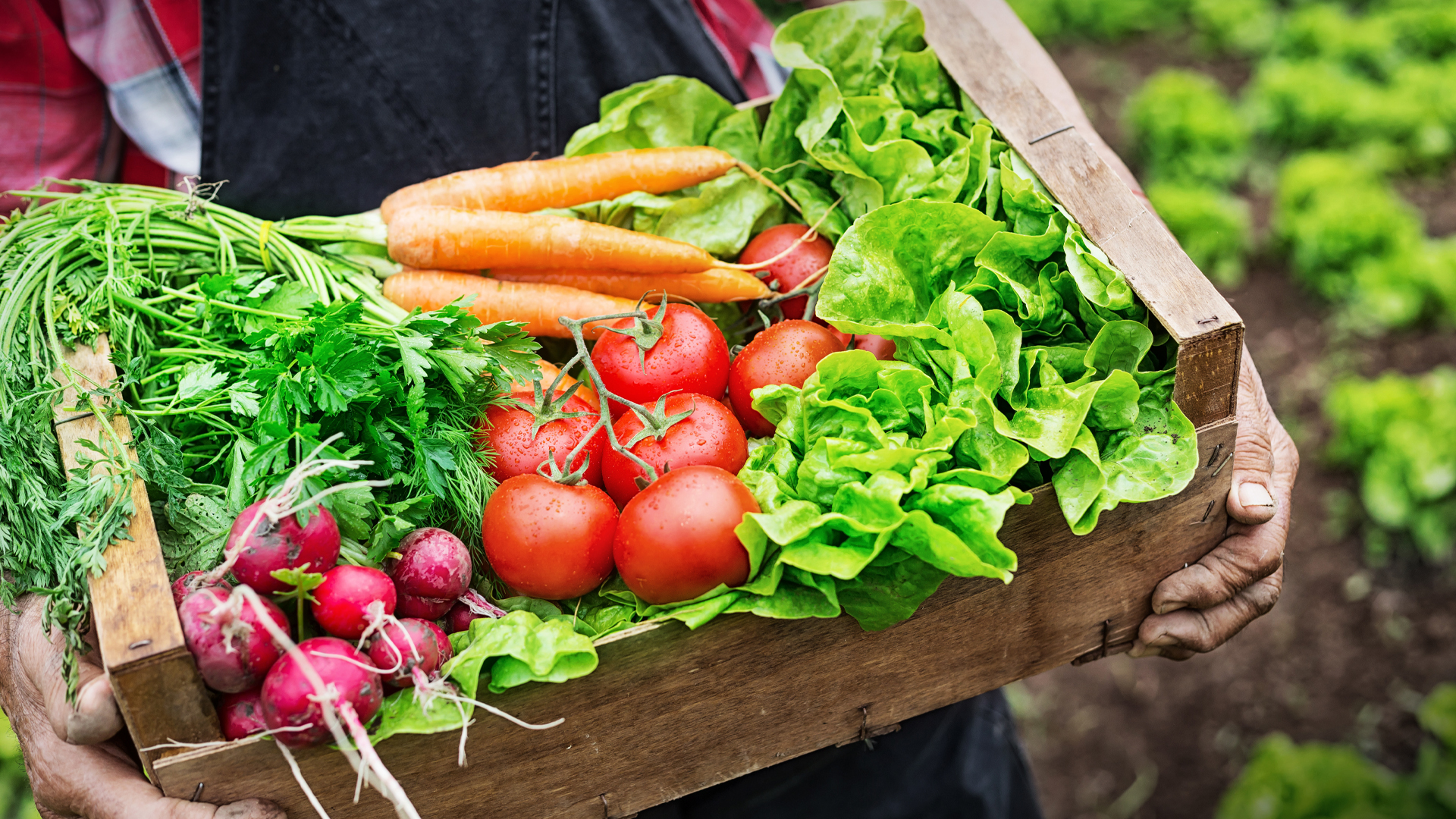Organic Vs. Non-Organic: What's the Healthiest Choice?

As a registered dietitian, one of the most common questions I get is: “Should I be buying organic?”
Let’s break down what the organic label actually means, what it doesn’t, and how to make informed food choices that support your health; without stress or guilt.
What Does “Organic” Mean in Canada?
In Canada, organic foods are regulated by the Canadian Food Inspection Agency (CFIA). For a product to be labeled “organic,” it must be certified under the Canadian Organic Standards. That means:
-
No synthetic fertilizers or pesticides (although natural pesticides are allowed)
-
No genetically modified organisms (GMOs)
-
No irradiation or artificial preservatives
-
Organic livestock must be raised with organic feed and without routine antibiotics or growth hormones
Organic farming uses different practices, but that doesn’t mean conventional farming is “bad” or unsafe. Let’s talk about why.
Are Conventional Foods Safe?
Absolutely. In Canada, all foods, whether organic or not, are strictly regulated by the CFIA to ensure they are safe to eat. That includes pesticide residues, antibiotics, additives, and more.
CFIA and Health Canada conduct regular surveillance, and data show that over 94% of produce in Canada has no detectable pesticide residue or residue well below safety limits.
Even better? You can use the Safe Fruits and Veggies Pesticide Calculator to see how many servings of your favorite fruit or vegetable you’d need to eat to reach a level that might pose a health risk. (Spoiler: it’s thousands per day.)
What About GMOs, Antibiotics, and Chemicals?
Let’s break down a few of the most misunderstood terms:
GMOs: Genetically modified crops are not harmful to human health. In fact, they can reduce pesticide use, improve crop yields, and make farming more sustainable. Major global health agencies, including the World Health Organization and Health Canada, agree that GMOs are safe to eat.
Antibiotics: In Canada, animals can receive antibiotics when medically necessary, but there are strict rules about how long farmers must wait before the animal’s products can be sold for food. By the time meat, milk, or eggs reach the store, they are tested and free from antibiotics.
Chemicals: Everything is made of chemicals, including water. What matters is the dose and type. Organic farming can still use natural pesticides (like copper sulfate), and these are not automatically safer or risk-free. “Chemical-free” is a marketing term, not a scientific one.
Is Organic Healthier?
Here’s what the research tells us:
Nutritional Content
-
Large meta-analyses (such as Stanford 2012 and Vigar et al., Nutrients 2020) show little to no meaningful differences in the nutritional content of organic versus conventional foods.
-
Some studies have found slightly higher antioxidant or omega-3 levels in organic produce or dairy, but these differences are small and unlikely to make a significant impact on health for most people.
Pesticide Exposure
-
Organic diets do result in lower levels of pesticide metabolites in urine.
-
However, the pesticide residues on conventional foods are already far below safety thresholds, so the benefit of further reduction is unclear. There is no strong evidence linking current levels of pesticide exposure from conventional foods to negative health outcomes.
Observational Studies
-
Some studies show that people who eat more organic foods have lower rates of certain health conditions, like metabolic syndrome or some types of cancer.
-
But these are observational studies. People who choose organic foods also tend to live healthier lifestyles overall:
-
They may exercise more
-
Eat more plants
-
Smoke less
-
Consume fewer ultra-processed foods
-
-
That means we can’t say organic foods are the cause of better health - it may be the overall pattern.
Should You Choose Organic?
If you prefer the taste, environmental impact, or farming practices of organic food - and it fits your budget - that’s a valid choice.
But if you’re feeling pressure or guilt to buy organic, especially when it’s not accessible or affordable, here’s the bottom line:
Eating more fruits and vegetables matters more than whether they’re organic or conventional.
Final Thoughts from a Dietitian
Your health doesn’t depend on whether you buy organic strawberries or conventional ones. What matters is:
-
Eating enough plant-based foods
-
Choosing fiber-rich whole foods when possible
-
Finding meals that are satisfying and easy to prepare
-
Building habits that feel sustainable
Organic food is a personal choice, not a nutritional requirement. As a dietitian, I’m here to help you feel confident in your food choices — whether you shop at the farmers market, grocery store, or both.
Food should nourish your body, not stress you out.
References & Further Reading
-
Vigar V, Myers S, Oliver C, Arellano J, Robinson S, Leifert C. A Systematic Review of Organic Versus Conventional Food Consumption: Is There a Measurable Benefit on Human Health? Nutrients. 2020;12(1):7. https://www.mdpi.com/2072-6643/12/1/7
-
Smith-Spangler C, et al. Are Organic Foods Safer or Healthier Than Conventional Alternatives? A Systematic Review. Ann Intern Med. 2012;157(5):348–366. https://pubmed.ncbi.nlm.nih.gov/22944875/
-
CFIA – Organic Products. https://inspection.canada.ca/organic-products/eng/1300139461200/1300140373901
-
Health Canada – Pesticides and Food Safety. https://www.canada.ca/en/health-canada/services/pesticides/canadian-residues-food.html
-
Safe Fruits and Veggies – Pesticide Residue Calculator. https://www.safefruitsandveggies.com/pesticide-residue-calculator/
-
UBC – Organic Foods: Are They Safer or Healthier Than Conventional Alternatives? https://med-fom-urlgsci.sites.olt.ubc.ca/files/2008/01/organic-foods.pdf
-
Nutrition Daily – Dirty Dozen Foods List: Is Organic Worth It? https://nutritiondaily.com/dirty-dozen-foods-list-is-organic-worth-it/
